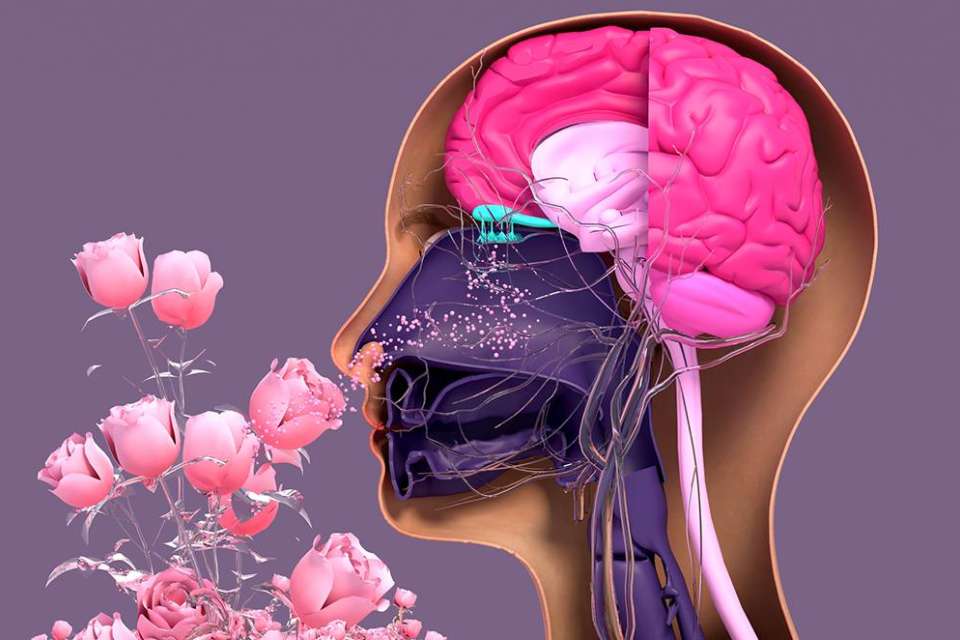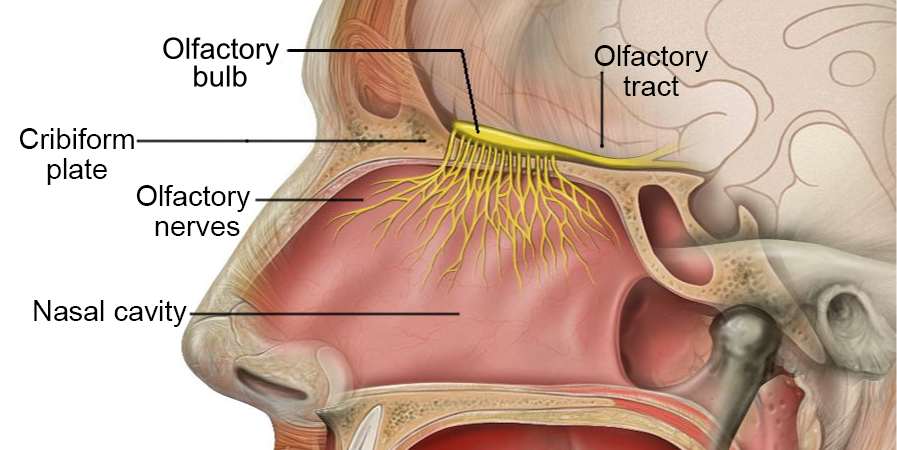
“Our sense of smell is one of our richest and wide-ranging windows into the world around us, playing a vital role in what we taste, our social interactions and even helping us detect potential dangers.” [1]
“Smell is an important sense as it can alert us to danger like gas leak, fire or rotten food but also is closely linked to parts of the brain that process emotion and memory. Unpleasant and bad smells actually send pain signals to the brain to warn us of possible danger.” [2]
“Sense of smell is vital for survival of most humans and animals as it enables them to track food and water, find a mate and even communicate. Although our sense of smell is not as acute as other animals, we know that humans are able to detect up to 10,000 different odor molecules.” [2]

How Does Smell Work?
“The sense of smell occurs when an odor transmits a signal through the olfactory system by binding with a receptor within the nasal cavity. The signals in these receptors are then aggregated by glomeruli and transmitted to the olfactory bulb. Here, they start to interact with regions of the brain that deal with identifying smells, emotion, and memory (the hippocampus and the amygdala.)” [3]
“When a substance releases particles into the air, a smell is created. In order for us to detect the odor, though, these particles must enter our nose.
The more easily a substance gives off molecules, the stronger you will find a smell to be. Objects that are non-volatile have very little smell if any at all.
Diffusion is the process through which smells travel through the air. This is when air particles, mixed in with the odor particles, move freely in the air and spread out in the environment around them.” [3]

Our sense of smell influences your everyday life
Smell and Emotion
“Attached to the memories that smells can remind you of are often emotions. Odors can impact our physiological and psychological states, which makes some researchers think that psychological problems might be able to be treated through odors, for example, reducing the effects of stress.” [3]
Smell and Memory
“Of all the senses, scent is most closely linked to memory. Studies have shown that people can remember a scent with 65% accuracy after one year while visual memory drops to 50% after only a few months. The smells we experience play a crucial role in how we associate with memories and places. Have you ever come across a whiff of something that instantly takes you back to an old memory? Whether it reminds you of your mother’s cooking or a childhood trip to the ocean, a distinctive scent sinks into your brain and stays there.” [4]

Smell and Mental health
“Your sense of smell is closely connected to the part of the brain involved in behavioral and emotional responses. That’s why certain odors spark strong emotions, influence behavior and trigger memories. Smell can also determine your attraction to other people.
People with anosmia may feel disconnected, indifferent, anxious or depressed. Studies show that a loss of smell can negatively affect relationships and increase feelings of isolation. In people with olfactory dysfunction, symptoms of depression often worsen with the severity of smell loss.” [5]

Smell and Taste
“Our sense of taste can be affected by our sense of smell. Amazingly, scientists believe that 80% of the flavors we experience when eating derive from the odors we smell. This is precisely why food can become bland and flavorless when you have a cold or your nose is otherwise stuffed up.
There are four qualities that our taste buds can detect. These are sour, sweet, salty, and bitter. The other tastes we assume result from our taste buds are actually distinguished through our sense of smell.” [3]

Is there treatment for loss of smell?
“If you’ve lost your sense of smell temporarily, things may smell different when the sense returns. Certain odors may register as unpleasant or altered from how you previously perceived them. The good news is that there are treatment options to help you regain your full sense of smell, including:
Smell training, which helps people relearn certain odors by sniffing them regularly in a controlled environment.
Steroids, if your smell loss is due to inflamed nose cells, which is common for people in early stages of a COVID-19 infection.
Researchers are also working to find new ways of activating the sense of smell for people with anosmia. Treatments including electrical stimulation and olfactory implants may one day be used to trigger the brain’s response to smell.
If you notice a loss of smell or a change in taste, make an appointment to see your primary care provider.” [5]

Sensory Activities suggestions for Adults with Disabilities that Engage Smell:
“Sensory activities are a great way for adults with disabilities to engage with their surroundings while creating a calm and relaxing environment. The goal is to help them feel safe and create conversation starters that can help ease their communication struggles. Sensory experiences can also help an adult with a disability create opportunities for exploration and learning and live a more enriching life.” [6]
“These are a few ways to engage an adult with a disability through sensory stimulation.
- Smell a fresh bouquet of flowers
- Make candles using different essential oils
- Play with scented Play-Doh
- Create art with scented markers
- Try cooking a recipe and smelling the different ingredients
- Go to a bakery and describe what you smell
- Do a blind smell test with air fresheners
- Tea Bag Matching Game” [6]

Resources
[1] https://www.bbc.com/future/article/20230220-is-air-pollution-causing-us-to-lose-our-sense-of-smell
[2] https://www.air-aroma.com/blog/why-is-sense-of-smell-important/
[3] https://www.scentcompany.it/en/news/why-is-smell-important-and-how-does-it-work-your-guide/
[4] https://www.ambius.com/blog/6-ways-smell-influences-your-everyday-life/
[5] https://www.uclahealth.org/news/why-your-sense-of-smell-is-important-to-your-health
[6] https://www.disabilitydame.com/sensory-activities-for-adults-with-disabilities/
